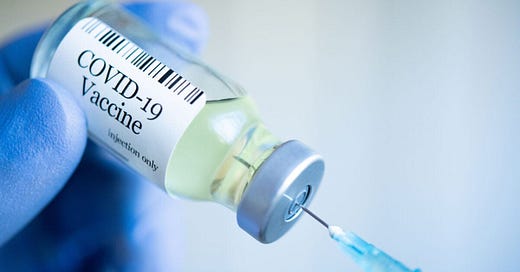This is part of a collection of guides on Covid-19
This is pretty short and simple:
Get a Covid booster (Moderna or Pfizer recommended)
The booster is estimated 2x more protective against Omicron. (Likely 1/4 to 2/3 the risk vs fully vaccinated without booster.) So get it as soon as possible. See CDC recommendations
Also get all the standard recommended vaccines e.g. the flu vaccine.
This is US-focused, but the general advice still applies to other countries.
More details on choosing a booster
I recommend Moderna or Pfizer boosters over J&J. I would slightly prefer a Moderna booster all else equal, but Moderna and Pfizer are very close, so pick whatever is available first or is more convenient or you feel more comfortable with.
This aligns with the CDC recommendation but for different reasons. My recommendation is based on early preprints 1 2 which compared antibody levels with different combinations of vaccines and found Moderna boosters yielded the highest, followed by Pfizer, then J&J lowest. However, these are only proxies for actual immunity, so it’s unclear what the actual size of the difference is. The studies also examined rates of side effects, which were generally similar.
If your first shot was Moderna and Pfizer, then J&J booster is probably not bad either, in case it's much easier to get for you.
Early studies indicate a booster gives 2x increased protection compared to 2 doses against Omicron (which has overtaken delta already).
The key result: Pfizer booster 73% (95% CI 58-83%) estimated efficacy against Omicron symptomatic infection, vs 35% (95% CI 20-50%) for vaccinated with 2 doses of Pfizer. Note that the confidence intervals are huge, so the range of how much more protection the booster adds on top of 2 doses Pfizer is roughly 1/4 to 2/3 the risk.
This is slightly lower than the estimated efficacy of 2 doses Pfizer/Moderna vs Delta is 83% (per microcovid)
Long-term vaccine efficacy against Delta
This was written before Omicron, but I’ll leave it here because I expect our understanding of vaccine efficacy after 6 months for 3-dose vs Omicron to look generally similar to 2-dose vs Delta (confidence: low).
tldr: Vaccines are still highly effective against Delta after 6 months, but boosters are even better.
Update: CDC now has data on infection rates between unvaccinated, vaccinated, and boosted.
Some early analysis based on e.g. the Israel data claimed vaccines lost most of their effectiveness after 6 months and/or against Delta. I believe that was based on fatally flawed statistics. Specifically, the vaccinated population is much older and the unvaccinated population much younger; after stratifying the data by age group it shows high vaccine efficacy (85-90%). See Israeli data: How can efficacy vs. severe disease be strong when 60% of hospitalized are vaccinated? This is a classic example of Simpson's paradox.
I think the Pfizer study is a better source. It found that efficacy peaked at 96% within 2 months of vaccination, and dropped to 84% after six months. That is still highly effective! (Better than J&J and AZ). 96% peak is a bit higher than the average, which I've usually seen put at about 90%. If we look at 90% -> 84%, that means the relative risk of infection increases from 10% to 16% at 6 months, which is a 60% relative increase, comparable to how much more infectious Delta was than earlier variants. That’s a significant difference, so boosters are still likely to be helpful, but 84% efficacy is still very good.
In the ongoing study, which enrolled more than 44,000 volunteers, the vaccine’s efficacy in preventing any Covid-19 infection that causes even minor symptoms appeared to decline by an average of 6% every two months after administration. It peaked at more than 96% within two months of vaccination and slipped to 84% after six months.
This article is an evergreen, living document that I will continue updating over time.
Like with all my posts, feedback/questions/comments are very welcome - feel free to send me an email or message, or comment on this post.



